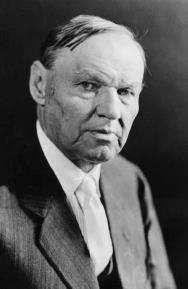The Fuller Court unanimously ruled 9–0 in Loewe v. Lawlor (1908) that the union activities of the United Hatters of North America and the American Federation of Labor violated the Sherman Antitrust law because it impeded interstate commerce and restrained trade. The individual members of the Hatters union in Connecticut, where the suit originated, contended that they were not subject to the Sherman antitrust acts because their conduct was intrastate in nature and only affected activities in Connecticut. The Fuller Court unanimously disagreed in an opinion written by Chief Justice Fuller. He wrote that the individual members were part of a broader union effort in various states that affected interstate commerce and trade. The ruling was a major victory for manufacturers and forced labor to petition Congress for statutory exemption from the labor laws.

Attorney Clarence Darrow (above) represented Eugene Debs in In Re Debs (1895). Hulton Archive/Getty Images.

